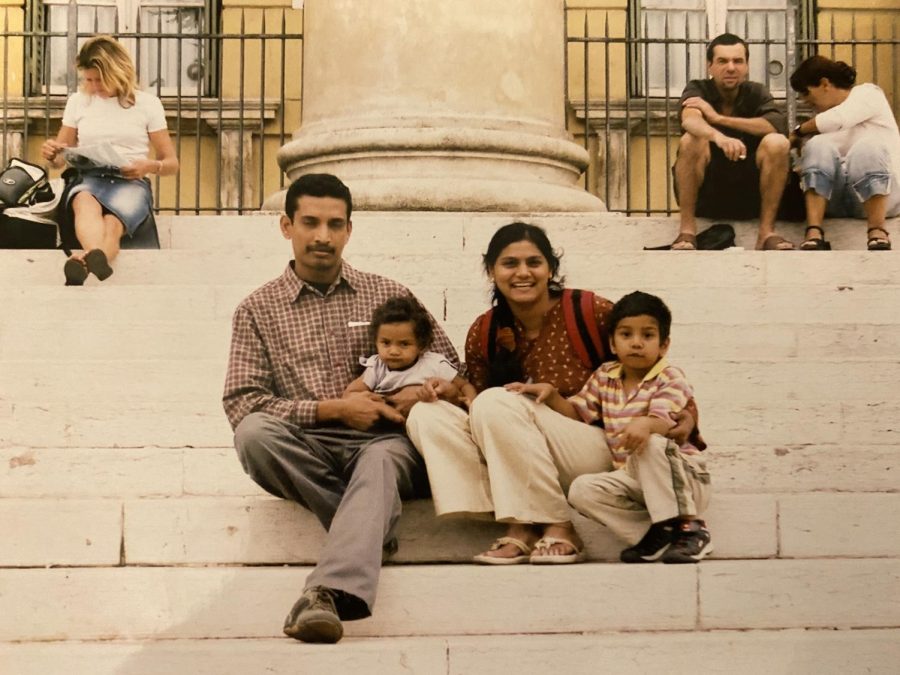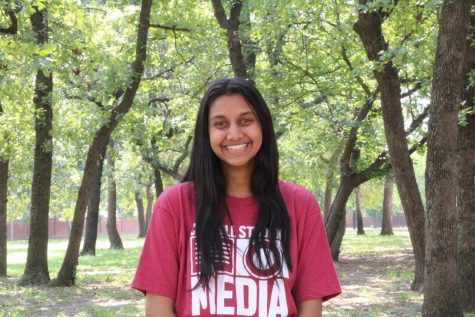Letter from the Editor: Thank you, finally
The Sidekick executive editor-in-chief Anjali Krishna, her brother Abhiram, father Sreekanth Krishnavajjala and mother Indira Asuri visit Italy in their tour around Europe in 2005. Krishna expresses what the words ‘thank you’ mean to her in relation to her parents.
March 31, 2022
Saying thank you in India is one of those odd behaviors that cement you as American in your foreign relatives’ minds, like putting on your seatbelt in the rare car ride. The average response to your thank you is an off-putting look, one that says: “Stop being weird. We’re family, aren’t we? Don’t be so formal.”
I don’t think I even know how to say thank you in Telugu, the language I try to speak with my relatives at home. Still, it’s one of those things instilled in every kid in American elementary schools, saying thank you to just about everything.
One of the things my parents brought over from India is the idea that a thank you is meant for more important things for people you aren’t close to – less a symbol of politeness and gratitude than one of formality. My brother is better able to surpass the cultural gap when we take the occasional visit overseas or at home with my parents, turning off his thanks, but for me, it’s a knee jerk reaction to being handed anything. My parents got over it quickly, or perhaps it quietly irks them and they remain silent about it.
Recently, however, they’ve started to thank me for things as well, or I’ve only just noticed them now, and they were right: it’s awkward – I got their wallet from the counter and they’re thanking me? Isn’t it obvious, isn’t it implicit in the relationship we’ve had for my entire life that I would do one of the very few simple tasks my parents ask of me, in comparison to everything they’ve handed to me with no expectations? Isn’t that gratitude something we know and accept already?
I never know exactly how to respond. The correct answer isn’t you’re welcome; that’s far too accepting of the message I feel in that thank you, the pressure that this simple act is one of a few or I am someone distant, needing to be thanked for something, rather than the action of giving living inherently in our relationship. It doesn’t feel like a ‘no problem’ or ‘no worries’ either. The correct answer is maybe ‘of course’ or ‘anytime.’
But even those feel like too much of an acknowledgement, acknowledgement that gratitude is necessary for me to bring a glass of water to the living room. So I often walk away awkwardly, unsure of how to finish the interaction. Because how inconsequential is this one action, this one action needing thanks, in comparison to everything my parents did for me as a child and now? In comparison to my dad waiting outside my room before I fell asleep because I was afraid of half-headed zombies in the movie he told me not to watch? In comparison to my mom waking up from the few precious hours of sleep she got to drive me to early to school every day since kindergarten?
To say I love you in Telugu, you say ‘prēmistunnānu’ and to me, love translates directly into gratitude. This splits into ‘prēm,’ the Hindi word for love and ‘istunnānu’ which means to give: literally, it translates to ‘I’m giving you my love.’ I don’t think I’ve ever said the words before. But I hope that with every one of the (few) drying racks I bring inside or (even fewer) trash cans I take out, my own thanks is intertwined in the rare chore I do, for everything you two have done for me.
Follow Anjali (@anjalikrishna_) and @CHSCampusNews on Twitter.











Sally Parampottil • Mar 31, 2022 at 6:16 pm
IS THAT BABY ANJALI I SEE